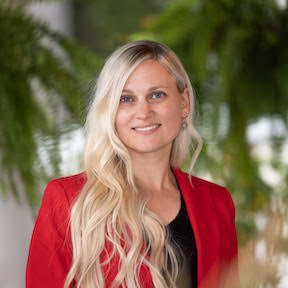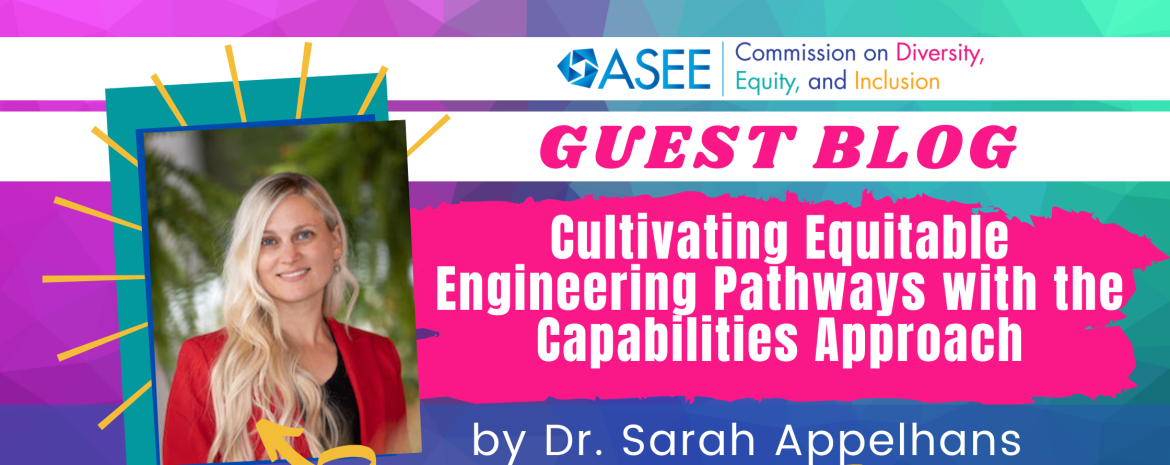Cultivating Equitable Engineering Pathways with the Capabilities Approach
By Dr. Sarah Appelhans
“Higher education fosters the development of individuals capable of leading fulfilling and responsible lives and who have a reflexive grasp of what is in the best interest of themselves, their families, their communities,
and their society” (Taylor et al. 2003)
What would it look like to give students more agency over their education?
Engineering degree programs are notoriously inflexible. From the moment engineering students arrive on campus their first semester, the next four to five years of their lives are plotted out in elaborate flow charts. Their pathways typically steer them into silos of disciplinary knowledge, leaving little time for exploration of their own interests. After college, students are often funneled into careers recognized as “engineering jobs”, offered by a suite of recognizable technical companies and government organizations. However, many of our students arrive in these careers having little idea of what they would really like to do. Having had inadequate time for introspection and exploration, they often emerge believing that securing a “good job” at graduation is satisfactory in and of itself. But is this truly good enough?
One of the core functions of higher education is to facilitate exploration, critical thinking, and self-knowledge. Advocates of the liberal arts in engineering have argued that providing more space for holistic education enables students to envision careers that better align technology and society. Many of our freshmen choose engineering because they want to make a positive impact on the world, but we provide too few opportunities for them to fully and critically explore how engineers impact society and the roles they might like to play.
Furthermore, the traditional education-to-career pipeline often does not work for underserved populations in engineering. Decades of investments in plugging leaks in the STEM pipeline have been rather ineffective in persuading women and racial minorities that engineering is a path that will help them achieve their own goals for their lives. Many students may prefer career paths that are outside the norm of the “traditional engineering job”, particularly if they have an opportunity to “bring engineering home”, so to speak, to make a positive impact on their communities-of-origin (Johnson et al. 2011; Ko et al. 2013; Riegle-Crumb, Moore, and Ramos-Wada 2011).
What would happen if we facilitated a new model of engineering education that recognized and supported a wider variety of student pathways? What impact would such a program have on improving students’ abilities to clearly articulate a vision of their future that fuses engineering knowledge with their own personal interests? How might the widening of potential engineering pathways result in better retention of underrepresented minorities and their ability to bring their whole selves to the discipline?

Cultivating critical thinking about societal impacts in a Bucknell ECE junior design course using prompt cards (Feb 2022).
Toward a Capabilities Approach for Engineering Education
This is the challenge we have undertaken in the Electrical and Computer Engineering Department at Bucknell University. Utilizing Amartya Sen’s “capability approach” (1999), student agency has become the focal point for expanding our definition of the engineering curriculum. Sen draws a distinction between capabilities and functionings. Each person has a “capability set”, which consists of intrinsic characteristics, acquired knowledge and experience. From amongst this set, individuals choose which capabilities to develop into functionings, which are achieved or enacted capabilities. In short, functionings are things individuals value doing and being. Sen argues that while a range of potential outcomes (functionings) are possible, the goalpost for equality should be set at the capability level – all persons should have equal capacity to live a life that they value.
Within the capabilities framework, the purpose of higher education is not knowledge dissemination or preparing students for a job, but a vehicle for creating educated persons capable of making good judgments (Nussbaum 2011, Walker 2006). Higher education capabilities include capacities for practical reason, knowledge, and imagination, but also contain less-recognized capacities such as educational resilience, learning disposition, social networks and relationships, respect and recognition, and bodily integrity (Walker 2006). Many of these capabilities are developed and supported outside of the classroom, but are crucial for ensuring an environment where learning is possible.
Our team is working toward a capability list that is tailored for engineering education. In our classes, we introduce students to specific disciplinary knowledge and mindsets (capabilities) that provide our students with a variety of potential pathways. Rather than focusing solely on technical content, we can expand students’ sense of possibility by exposing them to pathways that lie at the intersections of technology, the arts, the social sciences, and the humanities—futures that may better align with their personal interests. Students themselves will select the types of knowledge they value and develop those into functionings and pathways that align with their identities. Framed in this way, engineering expertise becomes one of several possible tools that students employ to create lives they value.

An ECE junior design project that centers student agency. Students selected a social issue they were interested in, in this case, sustainable transportation. They designed a conversion kit that adapts a regular bicycle to an e-Bike. Students conducted interviews with bike enthusiasts and other experts to develop a solution that meets the needs of users. (Nov 2021)
Prioritizing Student Agency in an Electrical and Computer Engineering Department
There have been multiple steps in the process of re-orienting the curriculum to prioritize student agency at Bucknell. The first step was to make the curriculum more flexible: reducing the number of mandatory courses and unlinking chains of prerequisites that constrain when students need to take particular classes (Heileman et al 2019). Next, under a NSF RED grant, we are taking a multi-pronged approach: a) to provide more opportunities for holistic education that links technology and society (aligned with NSF’s Convergence initiative), b) to reward students along pathways of their choosing (via holistic grading), and c) to encourage students to be more reflective about what they are learning and the kind of engineer they would like to become (through ePortfolios).
We have also formed a community of transformation (Kezar 2018) around the capabilities approach. Part reading group, part working group, it has become an important hub for engaging in discussions of what kinds of changes we envision for the department. Over the coming months, we will develop a tailored capability list that will serve as the target for equitable education in this context. From this vantage, we can begin to assess whether our students are currently receiving an equal opportunity to live a life they value with an engineering degree. We can also study the impacts of our curriculum changes, answering the questions: if we give students more freedom, what will they use it for? And does this ultimately lead to improved outcomes for underrepresented students?
You can read more about our work in the following papers:
– (forthcoming) Thomas, Rebecca et al. 2023. “Cultivating Reflective Engineers.” ASEE 2023 Conference Proceedings.
– (forthcoming) Cheville, Alan et al. 2023. “EC2000 Viewed through Amartya Sen’s Capability Framework.” ASEE 2023 Conference Proceedings.
– Cheville, Alan et al. 2022. “Supporting Convergence Development through Structural Changes to an ECE Program.” ASEE 2022 Conference Proceedings.
– Thompson, Stu et al. 2022. “Addressing Convergent Problems with Entrepreneurially-Minded Learning.” ASEE 2022 Conference Proceedings.
– Cheville, Alan et al. 2021. “Adding a ‘Design Thread’ to Electrical and Computer Engineering Degree Programs: Motivation, Implementation, and Evaluation.” ASEE 2022 Conference Proceedings.
References
Heileman, Greg, William Thompson-Arjona, Orhan Abar, and Hayden Free. 2019. “Does Curricular Complexity Imply Program Quality?” In 2019 ASEE Annual Conference & Exposition Proceedings, 32677. Tampa, Florida: ASEE Conferences. https://doi.org/10.18260/1-2–32677.
Johnson, Angela, Jaweer Brown, Heidi Carlone, and Azita K. Cuevas. 2011. “Authoring Identity amidst the Treacherous Terrain of Science: A Multiracial Feminist Examination of the Journeys of Three Women of Color in Science.” Journal of Research in Science Teaching 48 (4): 339–66. https://doi.org/10.1002/tea.20411.
Kezar, Adrianna, Sean Gehrke, and Samantha Bernstein-Sierra. 2018. “Communities of Transformation: Creating Changes to Deeply Entrenched Issues.” Journal of Higher Education 89 (6): 832–64. https://doi.org/10.1080/00221546.2018.1441108.
Ko, Lily T., Rachel R. Kachchaf, Maria Ong, and Apriel K. Hodari. 2013. “Narratives of the Double Bind: Intersectionality in Life Stories of Women of Color in Physics, Astrophysics and Astronomy.” AIP Conference Proceedings 1513 (1): 222–25. https://doi.org/10.1063/1.4789692.
Nussbaum, Martha C. (Martha Craven). 2011. Creating Capabilities: The Human Development Approach. 1 online resource (xii, 237 pages) vols. Cambridge, Mass.: Belknap Press of Harvard University Press. http://www.degruyter.com/isbn/9780674061200.
Riegle-Crumb, Catherine, Chelsea Moore, and Aida Ramos-Wada. 2011. “Who Wants to Have a Career in Science or Math? Exploring Adolescents’ Future Aspirations by Gender and Race/Ethnicity.” Science Education 95 (3): 458–76. https://doi.org/10.1002/sce.20431.
Sen, Amartya. 1999. “Development as Freedom,” January.
Walker, Melanie. 2006. Higher Education Pedagogies: A Capabilities Approach. London : Maidenhead ; New York: Society for Research into Higher Education ; Open University Press.
*This post was written in collaboration with the Bucknell RED Research Team: Alan Cheville, Michael S. Thompson, Stewart Thomas, Rebecca Thomas, Robert Nickel, and Philip Asare.
About the Author

Dr. Sarah Appelhans
Sarah Appelhans earned her PhD in Cultural Anthropology at the University at Albany (SUNY). Her dissertation research, Flexible Lives on Engineering’s Bleeding Edge: Gender, Migration and Belonging in Semiconductor Manufacturing, investigates the intersections of gender, race/ethnicity, and immigration status among semiconductor engineers. She is currently the resident ethnographer in the Electrical and Computer Engineering Department at Bucknell, exploring how to teach undergraduate engineers to work in an interdisciplinary way to solve complex societal problems. She will join the Engineering Studies Program at Lafayette College in the fall of 2023.
Connect with our guest blogger
Do you want to become a guest blogger?
CDEI Guest Blog highlight future events, describe best practices, or share calls to action by CDEI members. We invite you to propose posts that share brief research highlights, reports of impactful initiatives, critical thought pieces, and resources you find useful. We especially encourage emerging scholars to share their work. If you are interested in sharing a blog or resource post, you may submit your proposal here. All posts are screened and edited.

